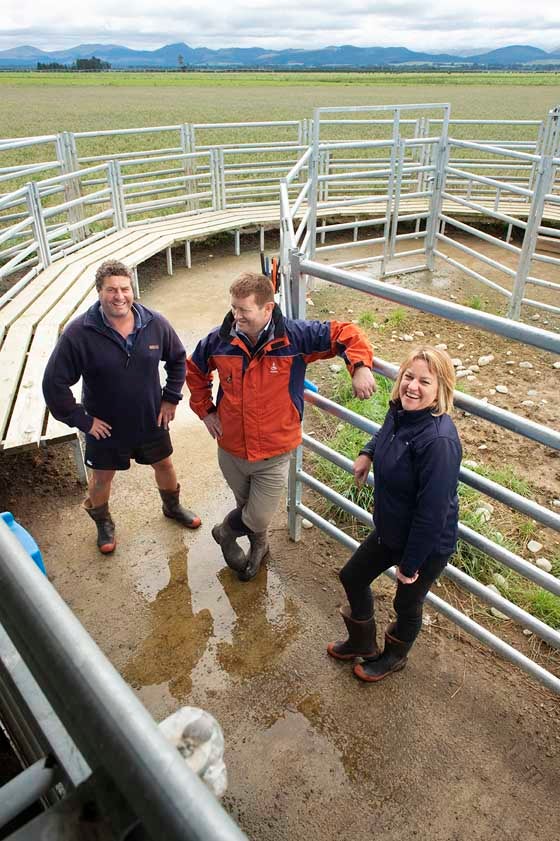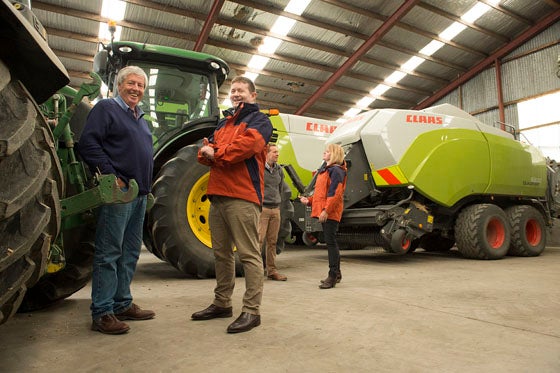Dunfield Farming
Rodney first came to the property about 20 years ago, as manager for owners Ross and Margaret Manson.
“I came to work for the Mansons in a manager’s role and it evolved from there. They offered us a shareholding in the land, stock and plant.”
They formed a company, with Rodney and his wife Sonia both shareholders, along with Ross and Margaret and their daughter Rowen Manson, who also works on the farm.
“ Rowen and I work on the farm doing all the day to day stuff and while retired Margaret and Ross still show a keen interest in the farm. Everyone lives on the farm, so it’s a bit like a family atmosphere.”
Irrigation transformation
The 400 hectare farm is flat and the move from dryland to irrigation has completely changed the way they do things. Now they focus on finishing and trading, predominantly beef, with some sheep.
“We’ve been shareholders in the Central Plains Water Scheme for a long time. The main headrace for the scheme bisects the farm, so we are right there at ground zero,” Rodney says.
“When the water became available we decided to go all out and irrigate the whole farm with 11 centre pivots. It was a whole farm development, we re-fenced the whole property. We had a new layout and new lanes to suit the irrigation."

“We had the massive windstorm in 2013. It basically flattened all the trees on the property and that gave us a clean slate to work with. When the wind stopped it looked like an absolute disaster, but in hindsight it was the best thing that happened.”
They buy in 350 to 400 heavier weaner calves in April to May each year from the weaner fairs, most of which are killed at about 15 months old – nothing stays beyond the first winter. The rest of the gaps on the farm are filled with older cattle, 15- 18 month animals. “We won’t winter anything more than one winter,” he explains.
They also like to stick to the traditional cattle breeds, mostly Angus and Hereford, which are fed on a diet of good quality ryegrass and clover-based pastures and wintered on a mix of kale and Fodder Beet.
“We use the Fodder Beet for finishing cattle over the winter. In the case of the calves, we start to kill at around Christmas time. A lot of the cattle we are killing are about 15 months, that’s why we target the heavier calves and pick the eyes out of the best lines.
“To get them to 280-300kg off mum, off harder country, they have to have something genetically going for them. The growth rates from spring on, once they come off the crop, are quite phenomenal.”

Diversifying the business
Nick also runs his own contracting business, Springdale Baling Contactors, focusing on baling and processing, with about a 60:40 split between straw and silage. They have grown the contracting business off-farm, incorporating Nick’s business with cultivation and harvesting services, offered to several neighbouring farms.
“It works well. The more we use it, the more important it becomes to the business,” Bill says.
The business has grown a lot since Nick started it seven years ago, though he is mindful that the farm is the first priority.
“I don’t want to be completely swallowed up in it, or for it to compromise the farm, but it’s enabled the farm to do a lot alongside it.” Nick hires the tractors from the farm and uses the farm’s gear. He is building a solid reputation in the area and is careful not to over-promise and under-deliver.
“I won’t take anything on unless I can actually deliver."
“We like to be efficient and are quite particular. We try to look after our lovely soils and the stock, we treat them as if they were our own. We also like to keep good gear up to speed, we can’t afford breakdowns when we’re so busy.”
At the peak of the season they employ three staff, as well as Bill and Nick, in the overall farming business. “Getting key people is important as well, it’s not a practice ground, so it’s about finding the right people.”
The contracting business complements the farming operation well, and fills in gaps when the farm is not as busy. “It helps pay some of our staff at times when the farm is quiet.”
Switching to Rabobank
The Daveys are relatively new to Rabobank, changing to the bank in 2016. The move has been a positive one, they say. “Rabobank approached us. We had a young bank manager approach us and we were all ears, if it would help improve the business,” Bill says.
"The package they put together was quite attractive compared to what our bank at the time was offering us. We’ve never looked back and are very happy with how we’re looked after and their knowledge.
“They’re a farming bank and know what they’re talking about. I don’t have to explain anything to our manager – he knows what I know – and that makes it much easier going forward.”

Nick says Rabobank has been very accommodating and has a great understanding of the seasonal peaks and troughs of their business.
“They’re always guiding me through and are eager to see the business grow. They are great people to deal with. They’re reasonably relaxed, but also very professional. “I have enjoyed being with them and would certainly recommend them.”
As for future plans, Bill says it’s nice to think opportunities to purchase more neighbouring land might come up, but for now they’re focused on what they’re already doing on-farm.
“Going through the periods we have been through, stability is important and keeping the ship on an even keel. Having a grandson in the business, his future is in my sights, to carry on the business in years to come.”
While moving to the other side of the world has provided the family with opportunities, it does come at a personal cost. “We were entering a different culture to embrace in New Zealand, but if we didn’t like it, we wouldn’t still be here,” Bill says. “We do miss our friends and family and we miss events, like weddings. My brother is still in England. But you can’t have everything, the priority is here and we have to manage it,” Nick adds.
Selling 700 acres in England enabled them to acquire 1200 acres in New Zealand, though Bill says it is becoming more and more of a challenge to stay profitable in the current climate. “Cereal prices the last couple of years have been in the doldrums and the low dairy payout as well, but we’re seeing a glimpse of light and the short term outlook for arable farming looks good, and we needed that in cropping.”
